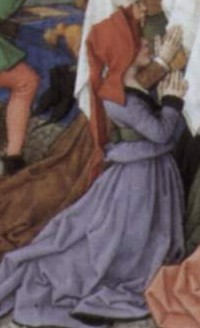
Liripipe
Encyclopedia

Clothing
Clothing refers to any covering for the human body that is worn. The wearing of clothing is exclusively a human characteristic and is a feature of nearly all human societies...
, the tail of a hood
Hood (headgear)
A hood is a kind of headgear that covers most of the head and neck and sometimes the face. They may be worn for protection from the environment, for fashion, as a form of traditional dress or uniform, to prevent the wearer from seeing or to prevent the wearer from being identified.-History and...
or cloak
Cloak
A cloak is a type of loose garment that is worn over indoor clothing and serves the same purpose as an overcoat; it protects the wearer from the cold, rain or wind for example, or it may form part of a fashionable outfit or uniform. Cloaks are as old as human history; there has nearly always been...
, or a long-tailed hood, in particular a chaperon
Chaperon (headgear)
Chaperon was a form of hood or, later, highly versatile hat worn in all parts of Western Europe in the Middle Ages. Initially a utilitarian garment, it first grew a long partly decorative tail behind, and then developed into a complex, versatile and expensive headgear after what was originally the...
or gugel
Gugel
A Gugel was a type of hood with a trailing point, popularly worn in medieval Germany. It was tailored to fit the head and shoulders, and was usually made from wool or loden. Originally worn by commoners, it became fashionable with the nobility from the 14th century...
, or the peak of a shoe. In modern times, the liripipe mostly refers to an element of academic dress
Academic dress
Academic dress or academical dress is a traditional form of clothing for academic settings, primarily tertiary education, worn mainly by those that have been admitted to a university degree or hold a status that entitles them to assume them...
, the tail of the cowl of an academic hood.
The word is believed to originate from the Medieval Latin
Medieval Latin
Medieval Latin was the form of Latin used in the Middle Ages, primarily as a medium of scholarly exchange and as the liturgical language of the medieval Roman Catholic Church, but also as a language of science, literature, law, and administration. Despite the clerical origin of many of its authors,...
term liripipium, which is of unsure origin. Webster's Dictionary
Webster's Dictionary
Webster's Dictionary refers to the line of dictionaries first developed by Noah Webster in the early 19th century, and also to numerous unrelated dictionaries that added Webster's name just to share his prestige. The term is a genericized trademark in the U.S.A...
suggests it is a corruption of cleri ephippium (clergy's caparison
Caparison
A caparison is a covering, or cloth, laid over a horse or other animal, especially a pack animal, or horse of state. In modern times, it is used mainly for decoration in parades and for historical reenactments. A similar term is horse-trapper....
) but the Oxford English Dictionary
Oxford English Dictionary
The Oxford English Dictionary , published by the Oxford University Press, is the self-styled premier dictionary of the English language. Two fully bound print editions of the OED have been published under its current name, in 1928 and 1989. The first edition was published in twelve volumes , and...
, attributing the hypothesis to Gilles Ménage
Gilles Ménage
Gilles Ménage was a French scholar.He was born at Angers, the son of Guillaume Ménage, king's advocate at Angers, where Gilles was born....
, calls it a "ludicrous guess".
Perhaps due to its academic association, it is also a word used to refer to "part or lesson committed to memory".
See "academic dress
Academic dress
Academic dress or academical dress is a traditional form of clothing for academic settings, primarily tertiary education, worn mainly by those that have been admitted to a university degree or hold a status that entitles them to assume them...
" for more information on hoods.
The word "liripoop" has also the meaning of "silly person", most probably because it is an inherently funny word
Inherently funny word
Words may be considered inherently funny, for reasons ranging from onomatopoeia to phonosemantics. Such words have been used by a range of influential comedians, including W. C...
, cf. "Nincompoop".

